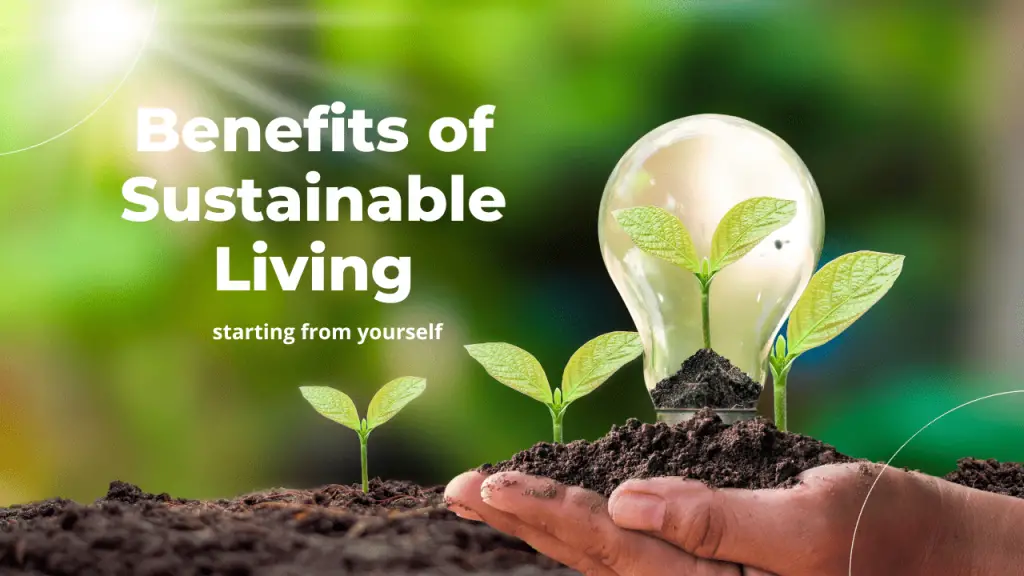The benefits of sustainable living are numerous. In recent years, sustainable living has gained popularity as people recognize the importance of preserving our planet. Individuals can lead a sustainable lifestyle by making conscious choices to reduce their environmental impact, such as using renewable energy, minimizing waste, and selecting eco-friendly products.
Although some may associate sustainable living with inconvenience and high costs for organic food and eco-friendly products, there are numerous benefits to adopting such a lifestyle. This article explores the critical advantages of sustainable living, including protecting the environment, improving personal health, and saving money over time. Individuals can positively impact themselves and society by incorporating small changes into daily habits.
Suppose you think about the prospect of global. In that case, we may categorize it into three parts: Environment, Economics and Health and Well-being Benefits.
1. Environment Benefits:
As environmental awareness grows, the world is turning towards sustainable living to reduce its carbon footprint and contribute positively to the planet.
Sustainable living offers a host of ecological benefits that contribute to the preservation of our planet. Here are some statistics highlighting these positive impacts:
Reduced carbon emissions:
Adopting sustainable practices, such as using energy-efficient appliances, driving electric vehicles, and harnessing renewable energy, significantly reduces carbon emissions.
Sustainable living offers numerous benefits, as highlighted by the International Energy Agency. It plays a crucial role in clean energy transitions, and deploying renewable power is a critical factor in limiting the rise in global temperatures to below 1.5 C.
Encouragingly, recent estimates indicate that renewable capacity additions will reach a record high in 2022, with an expected annual capacity of around 340 GW.
Introducing key policies such as REPowerEU and the U.S. Inflation Reduction Act will further support the acceleration of renewable electricity deployment in the upcoming years.
However, renewable electricity must expand even faster to achieve the milestones outlined in the Net Zero Emissions by 2050 Scenario. This scenario envisions an increase in the generation share from renewables from almost 29% in 2021 to over 60% by 2030.
Furthermore, The International Energy Agency (IEA) suggests that electric vehicles are crucial in reducing carbon emissions in the transportation sector, which currently contributes to 16% of global emissions.
In recent years, there has been a significant increase in the sales of electric cars, with advancements in technology resulting in better ranges, more models available, and improved performance.
The popularity of electric passenger cars is on the rise, and it is estimated that by 2022, 13% of new vehicles sold will be electric. If this growth continues, it could lead to a reduction in CO2 emissions from cars and align with the Net Zero Emissions by 2050 Scenario.
However, electric vehicles have yet to gain universal acceptance as developing and emerging countries face challenges such as higher purchase costs and a lack of charging infrastructure availability. Overall, sustainable living can bring numerous benefits to individuals and society.

Conservation of water resources:
Water is one of the most essential resources for life on earth. However, with the increasing population and changing climate conditions, it has become a scarce resource in many parts of the world. The adoption of the conservation of water resources has become a necessity to emphasize sustainable living practices.
Sustainable living is an approach that focuses on meeting our present needs without compromising the ability of future generations to meet their needs. Conserving water is integral to sustainable living as it benefits individuals and positively impacts the environment.
According to the U.S. Environmental Protection Agency (EPA), the average American household can save around 13,000 gallons of water and $130 in water costs per year by adopting water-efficient fixtures and behaviours.
Waste reduction and recycling:
In recent years, sustainability has gained increasing attention worldwide to promote long-term environmental and social well-being.
Sustainable living involves adopting lifestyles that prioritize preserving natural resources, reducing waste, and promoting healthy communities. One crucial aspect of sustainable living is waste reduction and recycling.
Adopting these practices promotes a circular economy, minimizes landfill usage, conserves energy, reduces greenhouse gas emissions and contributes to a cleaner environment.
The benefits of sustainable living are numerous. They include cost savings through reduced utility bills, improved air quality through reduced emissions from landfills and incinerators, and enhanced community health by reducing exposure to environmental toxins.
Sustainable living encourages waste reduction, recycling, and composting. Recycling just one aluminium (AL) can save enough energy to power a television for 3 hours and 14 watt CFL bulb (60-watt incandescent equivalent) for 20 hours, according to the U.S. Environmental Protection Agency.
Recycling and composting can divert significant waste from landfills and conserve resources. Our “Health Like Healthy” team ensures to dig down the topic of “considerable impact on earth waste from landfills” in the upcoming article.
2. Economic Benefits:
Adopting a sustainable lifestyle not only helps to reduce our carbon footprint but it also offers substantial financial advantages in the long run. By conserving resources, reducing waste, and making conscious choices about our consumption habits, we can save money while doing our part to protect the planet.
From energy-efficient appliances to eco-friendly transportation options, there are countless ways that we can make small changes in our daily lives that add up to a significant impact over time.
Let’s delve into some statistics that highlight the economic benefits of sustainable practices:
Energy cost savings:
Individuals can save money on energy bills by adopting energy-efficient practices and using renewable energy sources. For instance, according to the U.S. Department of Energy, switching to LED lights can result in up to 75% energy savings compared to traditional incandescent bulbs, not only that it’s last up to 25 times longer than incandescent lighting.
Job creation and economic growth:
The shift towards sustainable living creates new job opportunities in renewable energy, energy efficiency, and green technology sectors. According to the International Renewable Energy Agency, despite the challenges of COVID-19 and the energy crisis, the number of jobs in renewable energy worldwide increased by 700,000 last year, reaching 12.7 million. This highlights the positive impact of sustainable living on employment opportunities.
Long-term cost reduction:
Sustainable living prioritizes long-term benefits over short-term gains. Investing in energy-efficient appliances, home insulation, and renewable energy systems may require an initial investment. Still, the cost savings from reduced energy consumption can be substantial over time. For example, a study by the U.S. Department of Energy found that solar panels can provide a 10-30% return on investment over their lifetime.
3. Health and Well-being Benefits:
As we continue to learn more about the impact of human activity on the environment, it becomes increasingly clear that sustainable living practices are essential for our long-term well-being. Beyond helping preserve our planet’s natural resources, sustainable living directly and positively impacts human health and wellness.
From reducing exposure to harmful chemicals and pollutants to promoting healthy eating habits, countless benefits of sustainable living directly benefit individuals. Consider the following statistics that highlight the benefits:
Improved air quality:
By transitioning to cleaner energy sources and reducing carbon emissions, sustainable living contributes to improved air quality.
According to the World Health Organization (WHO), exposure to outdoor air pollution leads to approximately 6.7 million premature deaths annually. Shifting to renewable energy and reducing fossil fuel combustion can significantly reduce air pollution-related health issues.
In 2020, about 3.2 million deaths were attributed to household air pollution, with children under five accounting for over 237,000 fatalities. This highlights the importance and benefits of adopting sustainable living practices to reduce harmful effects on human health.
Enhanced mental and physical health:
Sustainable living promotes a closer connection with nature, which has been shown to improve mental health and well-being. Studies have found that spending time in green spaces can reduce stress, enhance mood, and increase overall life satisfaction.
The benefits of sustainable living go beyond just environmental conservation. Adopting a more sustainable lifestyle can lead to enhanced mental and physical health.
Studies have shown that individuals who live sustainably tend to have lower levels of stress, improved mental well-being, better physical health outcomes and increased overall life satisfaction.
From reducing exposure to harmful chemicals to increasing physical activity through active transportation, there are numerous ways in which adopting a sustainable lifestyle can lead to a healthier life.
Safer living environments:
Individuals can create safer living environments by adopting sustainable living practices, including using non-toxic cleaning products, consuming organic food, and minimizing exposure to harmful chemicals. This, in turn, can lower the likelihood of developing allergies, respiratory illnesses, and other health issues linked to toxic substances.
Now We can summarise the same; the benefits of sustainable living extend beyond individual actions; they can potentially create a transformative impact on our planet.
- Sustainable living has gained popularity in recent years for preserving the planet.
- A sustainable lifestyle involves conscious choices to reduce environmental impact.
- The benefits of Sustainable living include protecting the environment, improving personal health, and saving money.
- Small changes in daily habits positively impact individuals and society
- Sustainable living offers ecological benefits like reduced carbon emissions
- Using energy-efficient appliances, driving electric vehicles, and harnessing renewable energy help reduce carbon emissions.
The statistics presented in this article remind us of the power we hold as individuals to make a positive difference. Let us embrace sustainable living as a collective responsibility and pave the way for a greener, more sustainable future.


